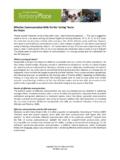Transcription of How You Can Help • A ToolKIT For FAMIlIeS
1 Module Three communication and problem-solving skills how you can help ToolKIT for FAMIlIeS 11 How You Can help A ToolKIT For FAMIlIeS Module 3 communication ANd PROBLEM-SolVING SKIllSElements of Good communication ..3 Expressing Ourselves Clearly ..3 communication Guidelines ..3 communication Is Both Verbal and Nonverbal ..5 communication skills ..5 Telling People What Pleases Us: communication of Praise ..5 Worksheet: Catch a Person Pleasing You ..6 Expressing Negative Feelings ..7 Listening ..9 Some Barriers to Listening ..11 Suggestions for Increasing Your Ability to Listen ..11 Supportive Listening skills ..12 Empathy ..12 Worksheet: Assess Your communication skills ..13 Dealing with communication Problems ..14 Talking to Children and Youth about Mental Illness.
2 14 Suggestions for What to Talk About ..15 Conflict Your Conflicts ..16A Structured Approach to Problem-Solving ..17 Problem-Solving Scenario ..19 Stages of Change ..20 Motivating Your Family Member to Make a Change ..22 Module Three communication and problem-solving skills how you can help ToolKIT for FAMIlIeS 2sophiaModule 3: communication and Problem-Solving SkillsWhen a family member suffers from a mental illness, one of the most important things to do is to take the time to learn about the disorder. By educating yourself as much as you can about the mental or substance use disorder, you can take an active role in your family member s re-covery. The Family ToolKIT was designed to assist FAMIlIeS in caring for a family member with a mental illness by providing information and practical resources.
3 The ToolKIT consists of five learning modules. Module 3 provides practical skill training in effective communication and problem-solving. The other four modules in the Family ToolKIT are: Module 1: Understanding Mental and Substance Use Disorders Module 2: Supporting Recovery from a Mental or Substance Use Disorder Module 4: Caring for Yourself and Other Family Members Module 5: Children and Youth in the School SystemFor more information on the Family ToolKIT and how it can be used please read the Introduc-tion to Family ToolKIT available from BC Partners for Mental Health and Addictions Informa-tion by calling 1-800-661-2121 or our website FAMIlIeS are also en-couraged to seek out books, articles, videos, and organizations who can further assist them in learning more about the specific disorder(s) that affect their family member.
4 About UsThe BC Schizophrenia Society and the Society for Kids Mental Health are members of the BC Partners for Mental Health and Addictions Information. The BC Partners for Mental Health and Addictions Information are a group of seven leading provincial mental health and addictions nonprofit agencies. The seven partners are Anxiety BC, BC Schizophrenia Society, Centre for Addictions Research of BC, Canadian Mental Health Association s BC Division, Society for Kids Mental Health, Jessie s Hope Society, and Mood Disorder s Association of BC. Since 2003, we ve been working together to help individuals and FAMIlIeS better prevent, recognize and manage mental health and substance use problems. BC Partners work is funded by BC Mental Health and Addiction Services, an agency of the Provincial Health Services Authority.
5 We also receive some additional support from the Ministry of Children and Family Develop-ment. The BC Partners are behind the acclaimed HeretoHelp website. Visit us at Acknowledgements and ThanksWe gratefully acknowledge the following persons and organizations who helped in the production of this ToolKIT . Eilleen Callanan, Martin and Marianne Goerzen who so kindly offered valuable comments on early drafts. Sharon Scott, edi-tor of the Family-to-Family Newsletter for letting us use some of their quotes from their Fall 2003 issue. All the FAMIlIeS who shared their stories so others would benefit. Julie Ward for allowing us to include mood charts for children. Dugald Stermer for giving us permission to use his illustration Through the Ages free of charge. Kayo Devcic, Alcohol and Drug Counsellor, Vancouver School Board.
6 Dolores Escudero, Mental Health Consultant, Provincial Services Division, Child and Youth Mental Health Policy and Program Support, Ministry of Children and Family Development. How You Can help . A ToolKIT For FAMIlIeS . 2004, (Updated 2010) BC Partners for Mental Health and Addictions Information. Permission is granted to reproduce this material for non-profit educational resource developed by the Nicole Chovil, PhD, British Columbia Schizophrenia Society with contributions from Keli Anderson, Society for Kids Mental Health. Funding for this project was provided by BC Mental Health and Addiction Services, an agency of Three communication and problem-solving skills how you can help ToolKIT for FAMIlIeS 33 IntroductionCommunication is one of the most frequent activities we engage in on a day-to-day basis.
7 It has been suggested that 75% of our waking time is spent communicating. How often have all of us probably felt at one time or another that we were not as effective as we would have liked in our communications with others? Success in communicating depends on the communication choices we make and awareness about the factors that can influence how messages are delivered and reacted to by others. The more you know about communication , the better your chances of communicating effectively. Practice is essential. You may find that as you read through this section, you are already doing the kinds of communication discussed in this section. If so, you can rest assured you are on the right track. These communication techniques are useful for everyone in the family including the person with the illness. Good communication enhances relationships between the person with the illness, their health care providers, and their family.
8 Mental and substance use disorders can create additional challenges, especially when the disorder affects a person s ability to think clearly or concentrate. Even at the best of times, it can be difficult to talk about sensitive topics. Sometimes communicating with a family member who has mental illness can be one of the hardest things we do. This is because, as family members, we bring a range of expectations and emotions to dealing with the goal of this section is to provide FAMIlIeS with the skills they need to discuss their thoughts, feelings, needs and problems constructively and successfully. This will help to ensure that issues are discussed and that action is taken to resolve should always include considera-tion of whether we are responding with the appropriate sensitivity to the well-being of the person who is receiving our of Good CommunicationIdeal communication , especially when mental illness is involved, should consist of a number of elements: Clear communication .
9 This will increase our chance that the message we intend to send is the one that is received. Willingness to listen to concerns and worries of family members. Use of language that is understandable to all persons a family member has a mental illness, effective communication is even more im-portant than usual. Your family member can experience stress when they have difficulty understanding what is said or what is expected of them. It can also be stressful when there are many arguments or too much criticism in the household. Stress is a common trigger for relapse, so it is important to reduce stress whenever communication takes time, practice and communication can help : Express concerns and worries you may have about your family member in a non-threatening way Reduce the risk of relapse by creating a positive environment at home Enhance communication with professionals involved in your family member s care in the resolution of problems To clarify what each member of the family can do to help facilitate recoveryModule Three communication and problem-solving skills how you can help ToolKIT for FAMIlIeS 4sophiaSuggestions for Making Clear Statements.
10 Good communication is a matter of practice, persistence and using many of the skills we already Guidelines Use short, clear direct sentences. Long, involved explanations may be difficult to fol-low as some mental disorders make concentrating difficult. Short, clear, and specific statements are easier to understand and answer. Keep the content of communication simple and focused. Cover only one topic; give only one direction at a time. Otherwise, it can be very confusing to follow the con-versation, especially for someone with a mental illness. Do what you can to keep the stimulation level as low as possible. A loud voice, an insistent manner, making accusations and criticisms can be very stressful for any-one who has suffered a mental breakdown. If your family member appears withdrawn and uncommunicative, back off for a while.








